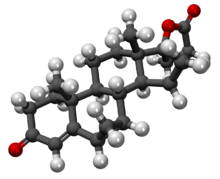Drospirenone
 |
|
 |
|
| Clinical data | |
|---|---|
| Pregnancy category |
|
| Routes of administration |
Oral |
| ATC code | |
| Legal status | |
| Legal status |
|
| Pharmacokinetic data | |
| Bioavailability | 76% |
| Protein binding | 95–97% (albumin) (Not to SHBG or CBG) |
| Metabolism | Hepatic (mostly -independent (reduction/sulfation and cleavage of lactone); minor CYP3A4 contribution (<10%)) |
| Biological half-life | 25–33 hours |
| Excretion | Renal and fecal |
| Identifiers | |
|
|
| CAS Number | |
| PubChem CID | |
| DrugBank | |
| ChemSpider | |
| UNII | |
| KEGG | |
| ChEBI | |
| ChEMBL | |
| ECHA InfoCard | 100.060.599 |
| Chemical and physical data | |
| Formula | C24H30O3 |
| Molar mass | 366.493 g/mol |
| 3D model (Jmol) | |
|
|
|
|
Drospirenone (INN, USAN), also known as 1,2-dihydrospirorenone, is a steroidal progestin of the spirolactone group used in birth control pills and postmenopausal hormone replacement therapy pills.
It is sold as a combined oral contraceptive under the brand names Yasmin (US, EU, Latin America), Jasmine (France), Yarina (Russia) in a dosage containing drospirenone 3 mg/ethinylestradiol 30 µg. In the United States, Bayer Schering released a pill based on Yasmin with the B vitamin folate (B9), which is marketed under the names Safyral and Beyaz.
Worldwide it is also sold under the brand names Yaz and Yasminelle in a lower dosage containing drospirenone 3 mg/ethinylestradiol 20 µg.
Drospirenone is an ingredient in some birth control pills and hormone replacement therapy. In combination with ethinylestradiol it is used as contraception, and for women who want contraception it is also approved by the U.S. Food and Drug Administration (FDA) to treat moderate acne and premenstrual dysphoric disorder.
Drospirenone is an aldosterone antagonist with potassium-sparing properties, though in most cases no increase of potassium levels is to be expected. In women with mild or moderate renal insufficiency, or in combination with chronic daily use of other potassium-sparing medications (ACE inhibitors, angiotensin II receptor antagonists, potassium-sparing diuretics, heparin, aldosterone antagonists, or NSAIDs), a potassium level should be checked after two weeks of use to test for hyperkalemia. In addition to contraindications common to all combined estrogen-progestin medications, drospirenone-containing medications are contraindicated in women with severe renal insufficiency according to European Medicines Agency (EMA)-approved labels, and contraindicated in women with renal insufficiency, adrenal insufficiency, or liver disease according to FDA-approved labels.
...
Wikipedia
